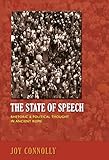The State of Speech : Rhetoric and Political Thought in Ancient Rome / Joy Connolly.
Material type: TextPublisher: Princeton, NJ : Princeton University Press, [2009]Copyright date: ©2007Edition: Course BookDescription: 1 online resourceContent type:
TextPublisher: Princeton, NJ : Princeton University Press, [2009]Copyright date: ©2007Edition: Course BookDescription: 1 online resourceContent type: - 9780691123646
- 9781400827947
- online - DeGruyter
- Issued also in print.
| Item type | Current library | Call number | URL | Status | Notes | Barcode | |
|---|---|---|---|---|---|---|---|
 eBook
eBook
|
Biblioteca "Angelicum" Pont. Univ. S.Tommaso d'Aquino Nuvola online | online - DeGruyter (Browse shelf(Opens below)) | Online access | Not for loan (Accesso limitato) | Accesso per gli utenti autorizzati / Access for authorized users | (dgr)9781400827947 |
Browsing Biblioteca "Angelicum" Pont. Univ. S.Tommaso d'Aquino shelves, Shelving location: Nuvola online Close shelf browser (Hides shelf browser)

|

|

|

|

|

|

|
||
| online - DeGruyter William Faulkner : An Economy of Complex Words / | online - DeGruyter The Importance of Feeling English : American Literature and the British Diaspora, 1750-1850 / | online - DeGruyter In Spite of Partition : Jews, Arabs, and the Limits of Separatist Imagination / | online - DeGruyter The State of Speech : Rhetoric and Political Thought in Ancient Rome / | online - DeGruyter The Cultural Contradictions of Democracy : Political Thought since September 11 / | online - DeGruyter Concealment and Revelation : Esotericism in Jewish Thought and its Philosophical Implications / | online - DeGruyter The Idea of Greater Britain : Empire and the Future of World Order, 1860-1900 / |
Frontmatter -- Contents -- Acknowledgments -- Abbreviations used -- Introduction Rhetoric and political thought -- Chapter One. Founding the state of speech -- Chapter Two. Naturalized citizens -- Chapter Three. The body politic -- Chapter Four. The aesthetics of virtue -- Chapter Five. Republican theater -- Chapter Six. Imperial reenactments -- Conclusion. The Ciceronian citizen in a global world -- Bibliography -- Ancient sources -- Index
restricted access online access with authorization star
http://purl.org/coar/access_right/c_16ec
Rhetorical theory, the core of Roman education, taught rules of public speaking that are still influential today. But Roman rhetoric has long been regarded as having little important to say about political ideas. The State of Speech presents a forceful challenge to this view. The first book to read Roman rhetorical writing as a mode of political thought, it focuses on Rome's greatest practitioner and theorist of public speech, Cicero. Through new readings of his dialogues and treatises, Joy Connolly shows how Cicero's treatment of the Greek rhetorical tradition's central questions is shaped by his ideal of the republic and the citizen. Rhetoric, Connolly argues, sheds new light on Cicero's deepest political preoccupations: the formation of individual and communal identity, the communicative role of the body, and the "unmanly" aspects of politics, especially civility and compromise. Transcending traditional lines between rhetorical and political theory, The State of Speech is a major contribution to the current debate over the role of public speech in Roman politics. Instead of a conventional, top-down model of power, it sketches a dynamic model of authority and consent enacted through oratorical performance and examines how oratory modeled an ethics of citizenship for the masses as well as the elite. It explains how imperial Roman rhetoricians reshaped Cicero's ideal republican citizen to meet the new political conditions of autocracy, and defends Ciceronian thought as a resource for contemporary democracy.
Issued also in print.
Mode of access: Internet via World Wide Web.
In English.
Description based on online resource; title from PDF title page (publisher's Web site, viewed 08. Jul 2019)


